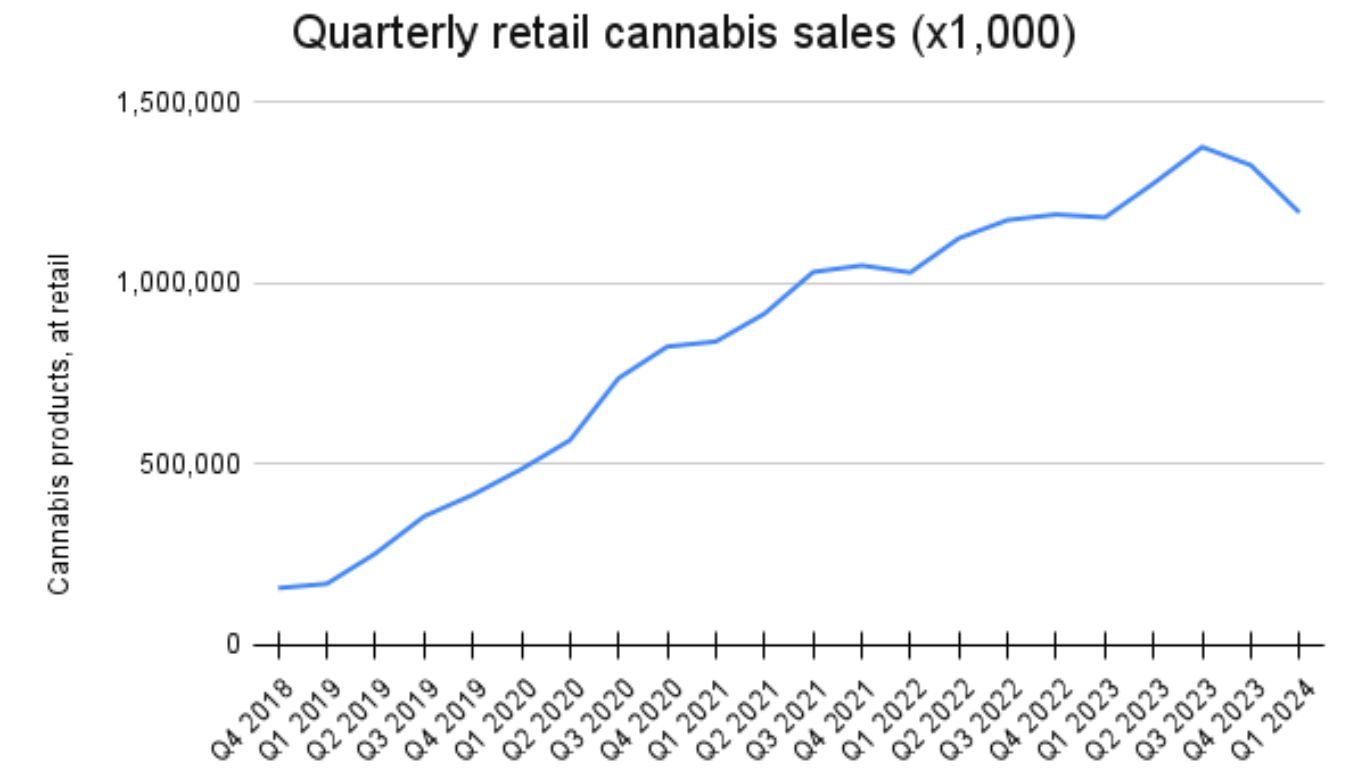
Retail cannabis store owners in Canada face ongoing challenges protecting their property from break-ins. Proprietors aren’t only having to deal with the stress and financial loss that comes from being victims of crime—they’re also forced to address the increased costs related to enhanced physical security.
“Metal gates have now been installed in our stores, and we sleep a lot better at night,” says Lisa Bigioni, co-founder and CEO of Stok’d Cannabis, which has four retail locations in Ontario, and which experienced two break-ins the week before Christmas. “It’s been costly. The gates were about $2,000 per store.”
The first break-in occurred at 5 a.m., and the second at 4 a.m. Bigioni had already invested in sophisticated security measures and was alerted by an alarm on her phone.
“I could see them in the store on the cameras and it felt—gross,” says Bigioni, who has three stores in Scarborough and one in Niagara Falls. “I called 911, and we hopped in the car and headed to the store, which is about 20 minutes from home.”
Both break-ins were done by the same people, with a sledgehammer used to smash double pane glass on the front door. A crowbar was also used to pry open locked product drawers behind the cash desk.
“The first time, they had to double back for the sledgehammer that they almost forgot. The second time, they did forget it. Both times, they were in and out in around a minute. We had their car and license plate on camera, but both turned out to be stolen.”
However, having a high-quality, functional CCTV system made a big difference.
“The fact that we’re compliant with our security cameras helped us capture them in action,” says Bigioni. “And this helped the police find them. In both cases, the police arrived before we did. The detective assigned to the cases was fantastic, and kept us well-informed along the way. Based on the evidence, he was confident the guys would be caught, which they were less than a week later.”
A high-quality video system seems like a logical choice. However, this isn’t always a priority for some stores.
“We see store owners and operators cutting costs in the quality of the equipment installed,” says a spokesperson for Northern Force Security, a Toronto-headquartered company with a cannabis security practice. “It may be CCTV cameras and systems of lower quality and functions, or insufficient access control systems and hardware.”
The Right Security Plan
Putting together a security plan is a balancing act between perceived risk and cost. This can be a challenge because often the vulnerability isn’t understood until after the fact.
“There is no equation to calculate the exact return on investment,” says the spokesperson for Northern Force Security. “Safety and security of clients and personnel is the most important investment return, but property loss and liability may also pose a real threat to the very existence of the business.”
From the perspective of Northern Force Security, it’s important for a cannabis retailer to get ahead of the problem in order to mitigate against the possibility of break-ins.
“After the second incident, we talked about my husband sleeping in the store. The police talked him out of it, and committed to stepping up patrols in the area.”
Lisa Bigioni, Stok’d Cannabis
“There are various solutions to mitigate ‘smash and grab’ and other opportunity crimes,” says Northern Force Security. “Policies should be combined with appropriate physical security means, and the combination should be executed by a customized and established security plan.”
A company like Northern Force Security, as well as global security firms like Garda, can also supply contract security guards. However, the added expense is beyond the means of many retail outlets.
“Private security is unaffordable, and not really an option,” says Bigioni. “After the second incident, we talked about my husband sleeping in the store. The police talked him out of it, and committed to stepping up patrols in the area.”
Bigioni’s concerns are echoed by Ryan Roch, the owner of Lake City Cannabis in Alberta.
“We have considered hiring private security, but it is far too expensive,” says Roch. “In the market we’re in, it’s just not feasible to remain competitive.”
Roch has some experience in this area, having weathered more than one break-in.
Back in September 2021, Roch’s Calgary location was robbed, which resulted in him arguing for a change to provincial rules that required retailers to cover their windows in opaque film. This has since happened in Alberta and British Columbia.
While this might be an improvement, it hasn’t solved the problem, as evidenced by the fact that Lake City Cannabis experienced another break-in this January, with a front door window smashed at 3 a.m.
“They immediately tried to break into our office to gain access to the vault,” says Roch. “They were unable to do so, and proceeded to get whatever they could that was on the floor.”
Roch is considering a similar approach to Bigioni at Stok’d.
“Now that the window films have been removed, I believe the AGLC and the federal government have gotten out of the way. The onus is on us as businesses to plan for the worst-case scenario.”
Ryan roch, Lake City Cannabis
“We’re looking at gates or roll shutters, but we have undertaken several additional steps in both the building and further upgrades later on,” he says. “Some of this was just the cost of doing business, but additional steps are always costly, especially at the wrong times.”
Roch doesn’t feel there is much left for the government to do from a policy perspective.
“Now that the window films have been removed, I believe the AGLC and the federal government have gotten out of the way,” he says. “The onus is on us as businesses to plan for the worst-case scenario.”
A proactive approach like physical gates can also help with business planning and continuity. Stok’d was hit by the same people twice in a short time frame, and the company had to scramble to find a solution.
“After the first incident, we made a number of calls to find metal gates or bars to protect the stores, but it was Christmas week and we were the only ones feeling the urgency, not the suppliers,” says Bigioni. “The second incident was only three days later on Christmas Eve, so we didn’t have anything installed yet.”
A Larger Trend?
Many observers think that cannabis retail break-ins are part of a larger trend, though there is no hard data to support this. In fact, if cannabis retail crime is on the increase, this is counter to a larger national trend, wherein overall break and enters declined 10% in 2021, with a longer-term decline of 21.4% since 2017. That said, federal numbers for 2022 are not yet available, and there is no specific breakdown for cannabis retail.
“It looks like things are getting worse, but I don’t have any actual data,” says Bigioni. “I know we weren’t the only store hit those nights. So, there’s that.”
StratCann has reported extensively on cannabis retail robberies over the years, with incidents in December 2020 and January 2021 in Calgary, in Hamilton in March 2022, and in London in September and October 2022 (including arrests), among others.
The result of all of this crime is that the industry is becoming savvier. Aside from metal gates and high-quality CCTV—including camera apps on phones—store owners told StratCann that they’ve made adjustments to store closing procedures, and installed panic buttons in case of robberies when staff are present.
“There are various solutions to mitigate ‘smash and grab’ and other opportunity crimes. Policies should be combined with appropriate physical security means, and the combination should be executed by a customized and established security plan.”
A spokesperson for Northern Force Security
All of this might reduce the number of incidents while also helping to solve crimes, but leaves an outstanding question: what role does insurance play? Insurance is an added cost, and a higher-risk environment could affect premiums.
“I’m not sure if our insurance will be affected, but I’m hoping that our new security gates might offset any premium increase,” says Bigioni. “Because we were hit twice, we had to pay two separate deductibles, which hurt.”
Having repeated break-ins—which both Lake City and Stok’d have experienced—can be a red flag for insurance companies. The rules differ by province, too, which could affect how risk is perceived. The AGLC, for example, mandates safes for secure cannabis storage.
“Alberta actually helps keep us from having products on the floor,” says Roch. “That said, given the frequency [of break-ins], I can see insurance in our industry becoming difficult.”












